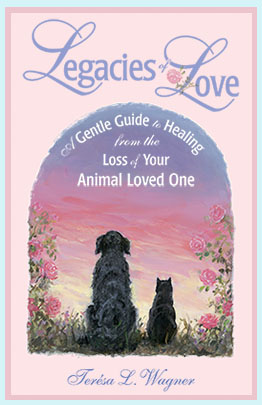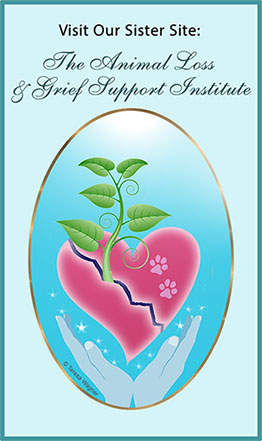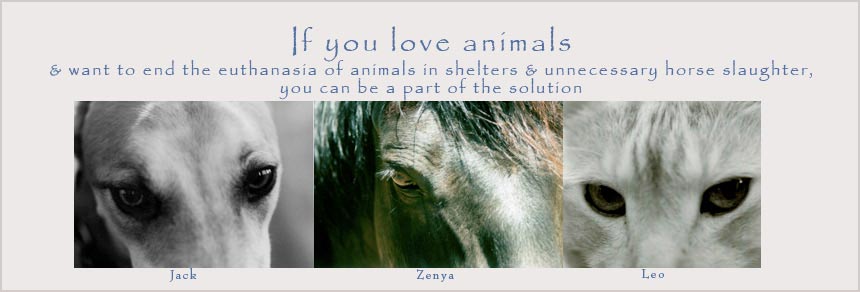Compassion Fatigue of Animal Care Work
Exploring our Core Beliefs and Motivations to Help Animals
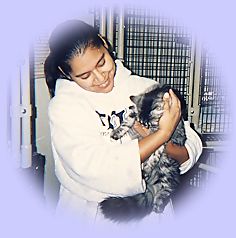
In response to both written surveys and verbal exercises in compassion fatigue workshops I've conducted, involving several hundred shelter employees since 1995, the number one reason people have given over and over again for doing this work is "because I love animals." As truly honorable and noble as this motivation is, it can sometimes go awry. Sincere love and compassion can give way to unhealthy boundaries. Dedication can turn into co-dependency. Empathy can become enmeshment. Commitment can turn into overcommitment and fatigue.
One of the most powerful things we can do to keep our love, compassion, empathy, dedication and compassion healthy and alive, for both the animals and ourselves, is to periodically examine our own beliefs and reasons for doing this work. Take a look at the statements below and use them as a gauge to see how your own thoughts and beliefs may be contributing to either compassion fatigue or your own inner peace.
Thoughts and Beliefs Which contribute to Compassion Fatigue
Write in the blank area next to each statement whether the statement relates to you in the present, in the past, both, or leave blank if not relevant:
_______ 1. I tend to love and care for animals first and tend to neglect myself.
_______ 2. Sometimes I think I take on the animals' suffering, or, I close myself off from feeling anything.
_______ 3. It makes me really uncomfortable or feel like a failure that I can't rescue every one, make it all better, fix it or solve the problems for every animal.
_______ 4. Nobody else could do just what I'm doing quite as good or thoroughly as I do it, or cares enough to do what I do the way that I do it, so I feel like I must do it all.
_______ 5. It's a lot easier for me to focus all my helping energy on the animals' pain and trauma than it is to face and work on my own issues in need of healing.
_______ 6. My heart goes out to abused, neglected, and unwanted animals because I know what this feels like. I don't want them to hurt--so if I give all my love to them, maybe I can feel better too. Sometimes I feel almost addicted to helping them, fixing problems for them, and being needed by the animals.
Thoughts and Beliefs Which prevent & heal Compassion Fatigue
_______ 7. I care for and love the animals very much, but I also take pretty good care of myself.
_______ 8. I try to comfort the animals and give them my love and compassion. I feel deep empathy for their pain but I don't take it on as my own.
I know that their pain is separate from my pain.
_______ 9. I believe I can make a difference for many animals whose lives I touch. Though sometimes sad and frustrated by the work, I still find satisfaction in doing what I can. I accept that I can't help them all, that there is a problem bigger than me. I does, however, feel good to be part of the solution.
_______ 10. I feel useful and good about giving my skills, gifts, and competencies for the animals. I feel good about giving back to the world by helping the animals. And I know there are many others who help also--I am not the only person who can help.
_______ 11. I love and care deeply for the animals, and I also pay attention to my own issues and strong feelings which need processing or healing.
_______ 12. I am aware of areas in my life where I didn't receive the nurturing, love and care all beings--including me--need and deserve. While it brings me great fulfillment to give these things to the animals, I am careful to give myself, and seek for myself, nurturing, love and care also.
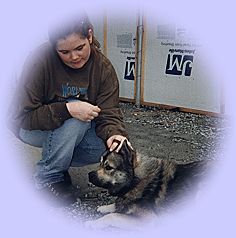
Ideally, the first set of statements would reflect our past, and the second set of statements would reflect our present (and perhaps past also).
A few years ago at a conference where this exercise was used in a workshop, a woman stood up afterwards and shared her reaction to it. She said, "I've been in this business for more than twenty years. Most of us start out with the first six of these statements being how we operate. Then, over time, if we're lucky, we learn to work from those second set of statements. I've seen my staff who can't make that change and they burn out, burn out bad. We have to operate from this second set (of statements), or we'll make ourselves crazy."
I couldn't agree more. And, some of us need some support and help in making those changes. I believe that many people come to this life with a deep, natural ability and desire to express compassion, empathy and love, and that they give these gifts as service to the animals. In being near many of these people in their professional and personal lives over the years, I've also come to believe that those who came here to give such compassion do that almost effortlessly. What does not seem to come effortlessly is giving those gifts to ourselves--to love and care for ourselves as well as we do those we serve. It seems to be almost a right of passage for dedicated helpers to learn to care for themselves as well as they do those they care so deeply about.
If this is an issue you are working on, an area in which you want to grow, you may want to read the following helpful books:
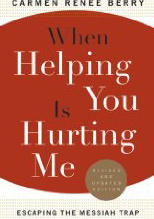 |
When Helping You Is Hurting Me: Escaping the Messiah Trap by Carmen Renee Berry |
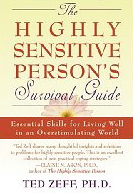 |
The Highly Sensitive Person's Survival Guide: Essential Skills for Living Well in an Overstimulating World (Step-By-Step Guides), by Ted Zeff |
 |
The Caregiver's Book: Caring for Another, Caring for Yourself, by James E. Miller |
COPYRIGHT AND AUTHORSHIP NOTICE: The information contained in this Compassion Fatigue section of my site was originally written in 1994, has been updated several times and has been copyrighted since its inception. In July 2015, Judy Scheffel used the material on these pages as if it was her own, violating copyright law and a written agreement to use it only with attribution, for a webinar organized by Lisa Levinson and sponsored by In Defense of Animals. A video of the webinar, in which Scheffel plagiarized thousands of words from this site and deceptively presented the models in these pages as if they were her own original concepts, appeared on the In Defense of Animals web site and on YouTube until August 20, 2016.
If you participated in this webinar or viewed it on YouTube, please be advised that authorship of approximately 80% of the webinar content includes material copyrighted by Teresa Wagner and was used fraudulently by Judy Scheffel.

